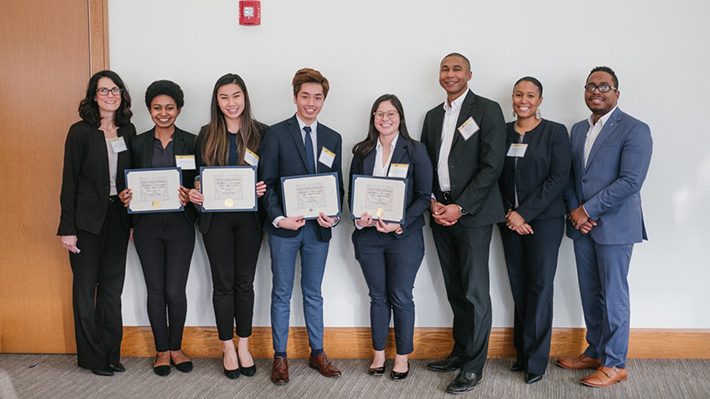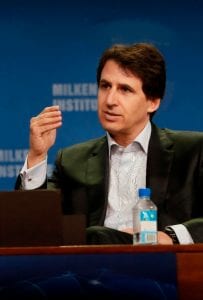What Are the 5 Most Common MBA Interview Questions?

To get into an MBA program, you’ll first have to make it through the interview process. Depending on where you apply, you could be asked a range of different questions, many of which are specific to the school. Unfortunately, this can make it difficult to prepare for success, especially if you’re applying to more than one school at a time.
To help you prepare for your MBA interview, we’ve gathered together the five most common MBA interview questions, along with advice for answering each question. But first, we need to figure out what questions you’re most likely to run into.

Determining the Five Most Common Interview Questions
In a recent podcast on Clear Admit, Alex Brown, who wrote Becoming a Clear Admit: The Definitive Guide to MBA Admissions, tackled some of the most common MBA interview questions faced by current applicants. He unpacked interview questions such as, “Walk me through your résumé” as well as “Give us an example of a time you took a leadership role.”
To get a full idea of the most common interview questions, we took a look at the top ten schools as outlined by the U.S. News & World Report to figure out which questions were asked by the most schools. We looked at:
- UC Berkeley Haas
- University of Michigan Ross
- Northwestern Kellogg
- MIT Sloan
- Stanford Graduate
- The Wharton School
- Chicago Booth
- Harvard Business School
- Columbia University
- Dartmouth Tuck
At each of these schools, there were a few common denominators when it came to questions asked. Here’s what we found:
1. Why did you choose this school/program?
Almost every school, except MIT Sloan and Harvard Business School, wants to know why you’re interested in their specific program. After all, admissions teams know that you’re interviewing at more than one school and they want to know that you’ve done your research and chose schools that were a good choice for you personally. They don’t want to necessarily know that you know the history or prestige of their school or program, they want to know how their program aligns with your goals and interests and how it makes practical sense for you.
When answering this question, you want to try and be as specific as possible when it comes to “why” this program. Be sure to know which clubs, classes, centers, professors, case studies, alumni, or events fit into your MBA goals. This is your best opportunity to demonstrate your research and to show the admissions committee doesn’t question why you chose them, and that you’ve taken the time to imagine what it’s like to attend their school.
2. Why are you pursuing an MBA now?
You can go back to school for your MBA at any time, but why are you interested in going back now? That’s what every school wanted to know except for Wharton, HBS, and Columbia. The goal with this question is to figure out how an MBA fits in with your current goals for your career and objectives.
During this question, you want to talk about your future career plans and why your situation in life is leading you to make a move to the MBA now. You’ll want to discuss your motivation for choosing the MBA now and how the MBA will help your long-term interests be accomplished. Make sure your explanation plots out a path where the MBA is vital to reaching your goals.
3. Walk me through your résumé.
All but four schools on our list asked students to walk them through their resume. Often, this is the first question that you may be asked in your interview. The goal of this question is to allow you to give a summary of your experience to date. This gives the interviewer some groundwork that they can build upon for the rest of the interview. So, how you answer this question is vitally important.
This question might appear very simple at first glance, but it can have a lot of little landmines that you’ll want to avoid. A good approach to this question is to think of it as your resume executive summary but in verbal terms. The interviewer is looking for key descriptive terms that define who you are. This is your opportunity to weave in some strengths, passions, and interests.
We suggest coming up with a two- to three-minute verbal version of your resume that focuses on highlights in your career. Make sure you focus on “why” you made certain career choices to better explain your path and then highlight the outcomes of those choices.
4. Tell me about a time you demonstrated leadership. What did you learn from it?
This can be a tricky question, but it’s definitely one that you could come across since all but four schools were reported as asking it. The goal here is to demonstrate that you’ve had some experience in a leadership role, even if it’s not traditional. During this question, you can speak about any influence you may have had over your peers—outside of traditional hierarchy—or leadership skills you may have gained during a project.
The key is to prepare three to four anecdotes that you can draw from to highlight such things as your leadership style and skills. In particular, make sure you can talk about key leadership skills such as vision, communication, teamwork, and so forth. And if you can, make sure you can quantify the outcomes of your experience.
5. Are there any questions you’d like to ask the interviewer?
At all but two of the schools—Harvard and Dartmouth Tuck—interviewees were asked to finish out the interview with their own questions. While this might appear to be a simple question at first, it is vital that you get it right. No admissions committee wants you to be a passive candidate, and this is your chance to demonstrate that you are thoughtful, prepared, and interested.
The key here is not to be generic and only ask questions like, “Why do you love X school?” Instead, you want to ask questions that are specific to your goals. For example, you might ask, “What other resources does the school offer for this industry?”
In the end, whether you’ve already been invited to a few interviews or you’re still waiting to hear back, it’s important to get prepared as quickly as possible. By practicing answers to some of these common questions, you can ensure that your interviews go off without a hitch.
The Muddled World of Leadership Cliches, and More – Philadelphia News

As November draws to a close, let’s take a look at some of the biggest business school stories coming out of Philadelphia business schools this week.
Three Big Leadership Clichés – and How to Rethink Them – LinkedIn
Geoffrey Garrett, Dean of The Wharton School and official LinkedIn “Influencer,” recently took to the social media site to talk about the gamut of leadership cliches that dominate the conversation around those roles.
In a conversation with a group of upper-level executives at the Wharton CEO Academy in New York, Garrett pivoted away from the following three cliches, turning them into something more modern, useful, and promising:
1.) Stick to your guns
2.) Question everything
3.) It’s a marathon, not a sprint
On sticking to one’s guns, Garrett emphasizes certain elements of 1980s corporate and political culture that found esteeming value when a leader does not waver on their principles. “Sticking to your guns is valued because it signals strength, courage and commitment under adversity, which is why we so often think about war heroes in this way,” he says.
He notes, however, that there is value in knowing when to “fold ’em” with a key Kenny Rogers reference in tow. “There is no simple score sheet to tell you when the positives from sticking to your guns become outweighed by the negatives. But the world is littered with examples where leaders wait too long to make the switch. Think General Lee’s historic defeat at Gettysburg in the American Civil War, Jeff Immelt at GE or John Chambers at Cisco,” Garrett continues.
“Most leaders will change course eventually because there is not much valor in heroic defeats. But the best leaders will change course long before the writing is on the wall. Compare the demise of Kodak with the transformation of IBM. But how do you know when the writing is on the wall? The answer is judgment, arguably the most valuable trait in a leader. It’s easy to recognize in hindsight, because good leaders make good decisions—the definition of good judgment.”
To see the rest of Garrett’s advice on leadership cliches, head over to LinkedIn.
Drexel Students Win Second Annual Diversity Case Competition – Drexel LeBow News
Students from the Drexel University LeBow College of Business brought home a brand new title as winners of the second annual Diversity and Inclusion Business Case Competition.
Drexel LeBow defeated 11 other local challenging universities in a competition with a goal to “help create a diversity training protocol for Home Away From Home, a global hotel chain,” according to the business school.

Winners from the LeBow College of Business at the second annual Diversity and Inclusion Business Case Competition / Photo via lebow.drexel.edu
The LeBow team of “Johnny Zhu, Kimberly Gain, Stephanie Arredondo, and Rachael Wright” nabbed first place with their curiously-titled “Raising Our One Family (ROOF)” strategy. Zhu explains, “ROOF stands for the overall company-wide training, which is rolled out in the form of top-down management and tailored to individual locations, corporate level, and field level. This proposal is not a mold, but a 360-integrated training approach where as a family, employees are living out the mindset of diversity and inclusion, not only to guests but to each other as well.”
To learn more about the Drexel LeBow team and the case competition, click here.
The Bizarre Bias That Affects How You Shop – BBC
The work of Beth Vallen, a researcher at the Villanova School of Business, was recently highlighted by author Martha Henriques in the BBC regarding just how pervasive “anti-fat” bias can be.
Henriques notes that overweight people tend to statistically suffer when it comes to things like job offerings, and even get less eye-contact than people of average weight and size. It is perhaps not so surprising to find that business models are often altered for overweight people.
In “Shape and Trait‐Congruency: Using Appearance‐based Cues as a Basis for Product Recommendations,” a new study authored by Vallen and colleagues Karthik Sridhar, Dan Rubin, Veronika Ilyuk, Lauren G. Block, and Jennifer J. Argo—published in the Journal of Consumer Psychology—found that overweight customers were offered more products that resembled their body types, even if the products, such as bottles of perfume, were not wearable.
Speaking with Henriques, Vallen says, “Our thinking was these subtle prejudices that lead to these effects are based on something more than superficial shape-matching.”
“We wanted to show that this was a bias that reflects the thoughts and decisions processes of all people, not just sales people.”
To read more about the study, head over to the BBC website and the Journal of Consumer Psychology.
Stanford GSB Tops Remodeled Bloomberg Businessweek Ranking

The Stanford Graduate School of Business is no stranger to a top spot, but this is their first time claiming top honors on the Bloomberg Businessweek Best B-School list for U.S. programs.
Wharton Reveals 2018 MBA Employment Report, Announces $25 Mil Gift

Lots of news out of the Wharton School at the University of Pennsylvania recently. Employment statistics have been published for the most recent graduating class, and a big donation will fund a cool new building dedicated to entrepreneurship in West Philadelphia as well as more international scholarships for undergraduates.
Here’s what’s going on at the Wharton School.
Penn Employment Report (2018)
The 2018 MBA Career Report revealed a slight increase in job offers and salaries with finance drawing in more students than ever. In 2018, 36.9 percent of full-time MBA graduates went into financial services (up from 33 percent last year). Consulting lured the second most graduates at 25 percent, down from 28 percent in 2017. As for technology—the third most sought-after industry—this year there was a small dip down to 14.9 percent from 16 percent in 2017.
Employment Summary
Overall, of the 77.9 percent of Wharton MBAs seeking employment, 98.4 percent received a job offer 90 days post-graduation, and 94.6 percent accepted. For the remaining 17.2 percent not seeking employment—140 students—84 returned to their current company (60 percent), 34 started their own company (24 percent), 17 postponed their job search (12 percent), and five students gave another reason (3 percent).
As for top employers, many prominent companies hired two or more graduates including Accenture Strategy, Facebook, Amazon, Apple, Bain & Company, Deloitte Consulting, McKinsey & Company, Microsoft, and Tesla.
Salaries Rise
Wharton MBA salaries continued their climb, with the school reporting a $5,000 increase in total median base salary, bringing that figure to $135,000 in 2018. The highest median salary—$180,000—went to graduates heading into professional services, followed by venture capital at $175,000 and hedge fund managers at $162,000.
As for regional differences in salaries, the 42.7 percent of Wharton MBA graduates who accepted positions in the Northeastern United States commanded a median salary of $140,000. Another 23.2 percent of grads headed to the West, where the median annual salary was $135,000. The Mid-Atlantic region of the U.S., with its median annual salary of $139,000, drew the third largest percentage of grads, at 7.7 percent. Interestingly, those who took jobs in the Midwest and South reported the biggest paydays, with a median salary of $150,000. This was trailed by the Southwest, with a median annual salary of $145,000.
Another 11.7 percent of the graduating class sought post-graduation employment outside the United States, where salaries on the whole were lower. In Latin America, the median annual salary is $92,000. Salaries are slightly better in Europe, where the median is $119,000, and best in Asia, at $126,000.

$25 Million Gift for Scholarships and New Hall
Right on the heels of publishing its employment statistics last week, the Wharton School also announced a $25 million gift. The transformative gift will go toward constructing Tangen Hall, the first-ever dedicated space for cross-campus entrepreneurship at the University of Pennsylvania. It will also establish an international scholarship fund.
“This gift not only represents a profound commitment to Penn and Wharton student financial aid; it also energizes our entire campus community through Tangen Hall, a game-changing facility for innovation, entrepreneurship, and technology,” Wharton Dean Geoffrey Garrett said in a press release.
Alumnus Donation
Nicolai Tangen, the founder of London-based investment partnership AKO Capital and 1992 Wharton undergraduate alumnus, encouraged the AKO foundation to donate as part of Wharton’s More Than Ever fundraising campaign.
“Katja and I are continually inspired by Penn students and pleased to have the opportunity to engage with them and set them up for success,” Tangen says. “We look forward to their many achievements in the years ahead and to witnessing how this new building will bring together the next generation of entrepreneurs, leaders, and innovators to share their talents with one another and for the greater good.”
Tangen Hall
Tangen Hall will be located at 40th and Sansom Street, offering students almost 70,000 square-feet of space to pursue entrepreneurial goals. The hall brings together students from across the university to participate in the new Venture Lab. Also, the building will become the new home of many entrepreneurship-focused programs including:
- Penn Wharton Entrepreneurship
- Goergen Entrepreneurial Management Program
- Weiss Tech House
- Sol C. Snider Entrepreneurial Research Center
- Wharton Small Business Development Center
- The Master’s Level Integrated Product Design Program
Tangen Hall will have dozens of meeting and collaboration spaces for students, retail space for student ventures, a test kitchen, a maker lab with 3D printers and laser cutters, a VR cave, and a café.
“Tangen Hall marks a new chapter for the entrepreneurial community at Penn and in Philadelphia, providing a central hub for the groundbreaking innovations that happen here every day,” Wharton Vice Dean of Entrepreneurship and Innovation Karl Ulrich says. “This physical space will allow faculty to more strongly support students who turn ideas into outcomes that will transform business for years to come.”
Construction will begin in 2019 with completion slated for 2020.
International Scholarship Fund
Beyond Tangen Hall, the $25 million will also go toward a new Katja and Nicolai Tangen International Endowed Scholarship, which will provide funding for international undergraduate students. The goal is to help students who could otherwise not afford a Penn education.
It’s the fourth scholarship made possible thanks to the AKO Foundation and the Tangens. So far, they’ve supported a total of 22 Penn students since 2012.
“We are profoundly grateful to Nicolai and Katja Tangen for their extraordinary commitment to extend opportunities for entrepreneurship to all Penn students,” Penn President Amy Gutmann says. “We are also grateful that Nicolai and Katja are expanding their steadfast scholarship support, enabling the best students from every part of the world to attend Penn, to thrive in their studies, and to serve communities worldwide.”
This article has been edited and republished with permissions from Clear Admit.
The Perfect MBA Career: Portfolio Manager

If working in investment strategy seems appealing, then a job as a portfolio manager may be right for you.
Wharton School Receives Largest-Ever Gift: $50 Million to Go Toward Faculty

Marc J. Rowan (W’84 & WG’85) and Carolyn Rowan recently gifted $50 million to The Wharton School, the largest-ever single gift to the business school. The generous Wharton donation will be used to help attract new world-class faculty, appoint new Rowan Fellows, and support the Penn Wharton Budget Model (PWBM), a groundbreaking economic policy analysis program.
“With profound gratitude to Marc and Carolyn Rowan, I anticipate the tremendous impact of their philanthropy on the University of Pennsylvania,” Penn President Amy Gutmann says in a university press release. “Their investment in Penn’s future will strengthen our intellectual resources, provide our students with life-changing mentors, and mobilize our knowledge for the advancement of society.”
Wharton Donation For Faculty
A good portion of the $50 million will be used to enhance faculty at the Wharton School. The goal is to help Wharton compete for the most talented business school professors in a highly competitive market. Specifically, the gift will be used to enhance Wharton’s ability to address complex global challenges through research and teaching.
Specifically, the $50 million will go toward faculty recruitment and betterment in two ways:
- Wharton will recruit three new Rowan Distinguished Professors. These individuals are leaders in their field and will help connect academia and business.
- The gift will also help the School appoint a select number of Rowan Fellows. These individuals will serve five-year terms and will receive support for the innovative research and teaching.
In a press release, Marc Rowan spoke about the gift’s impact on faculty, saying, “Carolyn and I are honored to join the vision of the Wharton community to bring the School’s outstanding students face to face with the most important thinkers of our time,” Rowan says. “As top Wharton researchers advance and shape their fields, they transform the lives of their students, preparing them to make a difference in the business world and beyond.”
Penn Wharton Budget Model
The gift enhances the Penn Wharton Budget Model (PWBM); a nonpartisan, research-based initiative that provides accurate, accessible, and transparent economic analysis of public policy. The project uses research briefs as well as interactive budget tools to analyze legislation. PWBM works directly with policymakers to provide the most effective insight on policy changes on Capitol Hill.
More Than Ever Fundraising Campaign
The gift comes to the school as part of the More Than Ever fundraising campaign, of which Rowan is the co-chair. The campaign started with a goal of raising $850 million. However, in part thanks to the latest gift, the goal is now $1 billion.
The More Than Ever campaign launched earlier this year with the goal of helping Wharton become synonymous with innovation, analytical decision making, entrepreneurship, and global leadership. The fundraising will go toward two flagship capital projects:
- A state-of-art academic building, which will stand beside Steinberg Hall-Dietrich Hall and the Mack Pavilion. This building will bring together Wharton’s cutting-edge research in business analytics, innovative learning, and teaching spaces.
- A new Venture Lab, which helps Penn students interested in launching new startups.
The gift from Rowan provides an excellent start for all initiatives.

Marc J. Rowan, Wharton W’84 & WG’85
“I am deeply grateful for Marc and Carolyn’s extraordinary gift, which reflects their passion to bring to Wharton the most innovative researchers working on the world’s most pressing and important questions,” Wharton Dean Geoffrey Garrett says. “Their commitment is the cornerstone of a campaign that will empower Wharton, more than ever, to create leaders who will change the world.”
Marc J. Rowan
Rowan is the Co-Founder and Senior Managing Director of Apollo Global Management, a private equity firm with $247 billion in investor commitments. The firm is a leading alternative asset manager with focus on private equity, credit-oriented capital markets, real estate, and insurance investments.
Beyond his work at Apollo, Rowan is an active member of the Wharton community. He graduated Summa Cum Laude from the school with a BS and an MBA in finance. Then, since 1994, he’s been contributing to Wharton’s success in a variety of ways.
Through philanthropy, Rowan has supported both undergraduate and MBA aspects of Wharton. He has contributed to financial aid, faculty, the Dean’s fund, capital projects, Wharton Customer Analytics, The Wharton Fund, the football program, the Institute for Contemporary Art, and more. Rowan is also the chair of Wharton’s Board of Overseers as well as being a Penn trustee.
To read more about the Wharton donation, check out the original press release at Wharton News.

